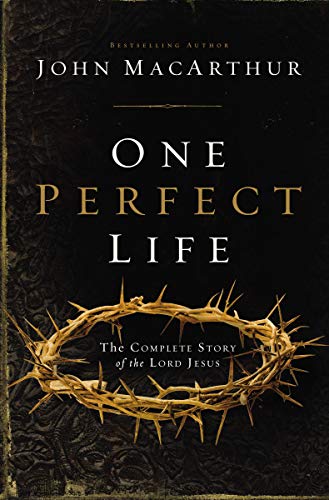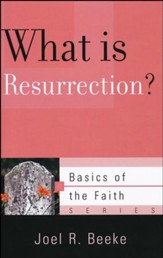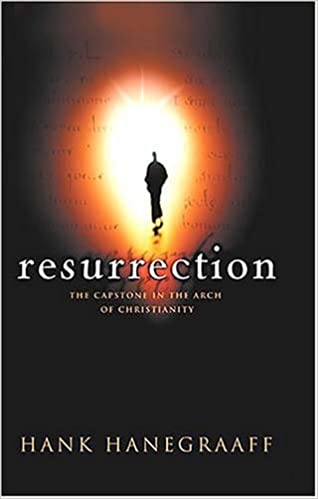Quotes about Jesus_Christ-Resurrection
The evidence for our Lord’s life and death and resurrection may be and often has been shown to be satisfactory. It is good according to the common rules for distinguishing good evidence from bad. Thousands and tens of thousands of persons have gone through it piece by piece as carefully as every judge summing up a most important cause. I have myself done it many times over, not to persuade others but to satisfy myself. I have been used for many years to study the histories of other times and to examine and weigh the evidence of those who have written about them, and I know of no one fact in the history of mankind which is proved by better and fuller evidence than the great sign which God hath given us, that Christ died and rose again from the dead.
Excerpted from: The Resurrection of Jesus Christ – Part 2 by John MacArthur, the article originally appeared (http://www.gty.org/Resources/Sermons/2402_The-Resurrection-of-Jesus-Christ-Part-2) at www.gty.org. © 1969-2008. Grace to You. All rights reserved
Christ was wrongly accused and executed by Satan’s earthly pawns. But His resurrection vindicated Him in the law courts of heaven and enabled Him to take away the devil’s right and power as heavenly prosecutor.
Revelation, The New International Greek Testament Commentary, Eerdmans, www.eerdmans.com, 1999, p. 664.
No religion stands or falls with a claim about the resurrection of its founder in the way Christianity does.
Taken from The Historical Reliability of the Gospels by Craig Blomberg. Copyright (c) 1987, InterVarsity Christian Fellowship/USA. Used with permission of InterVarsity Press, P.O. Box 1400, Downers Grove, IL 60515. www.ivpress.com, p. 77.
The resurrection of Christ is the Amen of all His promises.
Without the belief in the Resurrection the Christian faith could not have come into being. The disciples would have remained crushed and defeated men. Even had they continued to remember Jesus as their beloved teacher, His crucifixion would have forever silenced any hopes of His being the Messiah. The cross would have remained the sad and shameful end of His career. The origin of Christianity therefore hinges on the belief of the early disciples that God had raised Jesus from the dead.
These first-century Jews – thousands and thousands of them – suddenly changed their normal day of worship from Saturday to Sunday. Sociologists tell us that the most ancient parts of a culture are found in its religious rites. They are the most conservative elements of a culture, the least likely and slowest to change. What then can account for this sudden change around the Mediterranean, among thousands of first-century Jews, from worshiping on Saturday to worshiping on Sunday?
Delivered Over to Death for Our Sins by Mark Dever and Michael Lawrence taken from It Is Well, by Mark Dever and Michael Lawrence, copyright 2010, Crossway Books, a division of Good News Publishers, Wheaton Illinois 60187, www.crosswaybooks.org, page 141.
A denial of the resurrection does not figure in early anti-Christian apologetics. That would be the obvious thing to attack if you wanted to stamp out this fledgling religion, right? But no one attacks it. Why do you think that is? I think it was because too many people knew it was true. There may have been bewilderment about its significance, but the fact of Jesus’ resurrection was never denied. Jesus was clearly raised from the dead. The argument was simply about what that could possibly mean.
Delivered Over to Death for Our Sins by Mark Dever and Michael Lawrence taken from It Is Well, by Mark Dever and Michael Lawrence, copyright 2010, Crossway Books, a division of Good News Publishers, Wheaton Illinois 60187, www.crosswaybooks.org, page 141.
The disciples were transformed. Something happened to Peter. Just a few days earlier his hopes had been dashed and he had denied Jesus in front of a few people he had never met. Yet just a few days later, he was fearlessly preaching about Jesus and explaining Jesus’ death to the very people who killed Him. From dashed hopes to death-defying faith – not just in Peter, but in all the disciples.
Delivered Over to Death for Our Sins by Mark Dever and Michael Lawrence taken from It Is Well, by Mark Dever and Michael Lawrence, copyright 2010, Crossway Books, a division of Good News Publishers, Wheaton Illinois 60187, www.crosswaybooks.org, page 140.
If Christ were not raised from the dead, then He is morally unable to save. Jesus told of His future death and bodily resurrection on numerous occasions prior to it happening, and those predictions were lies if not fulfilled. Deception negates His larger message. A deceiver could not be God, or a sinless Savior. As sinful, He would not be able to satisfy the just requirements of the Father for a substitute on behalf of sinful people. If He were not raised, you should not only refuse to listen to Him; He could not save you even if you did.
Bulletin Insert – “Tom, Risen from the Dead,” Christian Communicators Worldwide, www.CCWtoday.org. Used by Permission.
If Jesus were not raised from the dead, the disciples were at best fools, and at worst, liars. What we know about the Christian life comes from the pen of men moved and guided by God to write the words we call the New Testament. The original apostles died martyrs’ deaths on the basis of their belief that the resurrection took place just as predicted, and that they saw Him alive again. If it were not true, then they were either duped, or else they fabricated the resurrection as a means to shore up the movement. But would they pay the ultimate price for a lie they had manufactured in order to have a job? Not so. Paul speaks of the absurdity of this in the following way: “And if Christ is not risen, then our preaching is empty and your faith is also empty. Yes, and we are found false witnesses of God, because we have testified of God that He raised up Christ “(1 Cor. 15:14-15).
Bulletin Insert – “Tom, Risen from the Dead,” Christian Communicators Worldwide, www.CCWtoday.org. Used by Permission.
If Jesus were not raised from the dead then we could not have assurance that the price of our sins has been paid. Christ was the perfect Lamb offered in our place, the single sufficient sacrifice for the sins of all who would believe on Him. His death provided our only way of being accepted by God. Without it we are doomed. Christ’s resurrection is the assurance that this was completed, and that sin and its resulting death (physical and spiritual) was fully overthrown. What assurance could we have that the work promised had been done through the means of the cross if He did not rise to verify it?
Bulletin Insert – “Tom, Risen from the Dead,” Christian Communicators Worldwide, www.CCWtoday.org. Used by Permission.
Imagine, for a moment, the reaction of Hell to the death of Christ. Jesus was bound with the bands of death. What celebration and joy! God was defeated! Vengeance was the Devil’s. But they reckoned without the wisdom of God. For Christ could not be held down by the bands of death. In fact through death He was paralyzing the one who had the power of death, and He was setting His people free (Heb. 2:14-15). What seemed to be defeat was actually victory. The Resurrection morning was Hell’s gloomiest day. Satan saw the wisdom of God and tasted defeat.
Most other religions are based on their teachings. Christianity is based on the death of Christ and the Resurrection that attests its efficacy. The idea of the Resurrection was scorned by most people, as the response of the philosophical Athenians to Paul indicates: “When they heard about the resurrection of the dead, some of them sneered” (Acts 17:32). But Christianity has stood the test of time. This is significant because Christianity is the only religion that stands or falls on the truthfulness of an event. Its survival is evidence that its unique basis, the Resurrection, is indeed valid.
The Evidence for the Resurrection by Ajith Fernando taken from The Supremacy of Christ by Ajith Fernando, copyright 1995, Crossway Books, a division of Good News Publishers, Wheaton Illinois 60187, www.crosswaybooks.org, p. 253.
Most of the disciples were martyred for their faith. But none of them recanted their affirmation in order to save their lives. Someone surely would have done so if they had even a doubt that the Resurrection was not true.
The Evidence for the Resurrection by Ajith Fernando taken from The Supremacy of Christ by Ajith Fernando, copyright 1995, Crossway Books, a division of Good News Publishers, Wheaton Illinois 60187, www.crosswaybooks.org, p. 254.
Christianity does not hold the Resurrection to be one among many tenets of belief. Without faith in the Resurrection there would be no Christianity at all. The Christian church would never have begun; the Jesus-movement would have fizzled out like a damp squib with His execution. Christianity stands or falls with the truth of the Resurrection. Once disprove it, and you have disposed of Christianity.
If Christ is truly God, His claim to be the only way has to be taken seriously. If on the other hand, He is merely one more person in a pantheon of pretenders, His proclamations can easily be pushed aside. That is precisely why the resurrection is axiomatic to Christianity. Through the resurrection, Christ demonstrated that He does not stand in a line of peers with Buddha, Baha’u’llah, Krishna, or any founder of a world religion. They died and are still dead, but Christ is risen. Ultimately, resurrection and reincarnation are mutually exclusive because the former is a historical fact, while the latter is but a Hindu fantasy.
The resurrection is not merely important to the historic Christian faith; without it, there would be no Christianity. It is the singular doctrine that elevates Christianity above all other world religions. Through the resurrection, Christ demonstrated that He does not stand in a line of peers with Abraham, Buddha, or Confucius. He is utterly unique. He has the power not only to lay down His life, but to take it up again.
What happened as a result of the resurrection is unprecedented in human history. In the span of a few hundred years, a small band of seemingly insignificant believers succeeded in turning an entire empire upside down. As has been well said, "They faced the tyrant’s brandished steel, the lion’s gory mane, and the fires of a thousand deaths," because they were utterly convinced that they, like their Master, would one day rise from the grave in glorified, resurrected bodies.
Christ’s resurrection was the work of the Triune God. The Father raised Him from the dead (Rom. 6:4; Gal. 1:1; 1 Pet. 1:3). So did the Spirit (Rom. 8:11). And the Son took back the life which He had laid down (Jn. 10:18; cf. 2:19, 21; 11:25). For the comfort of believers, these three are and always will be One.
This has led us to designate Jesus’ resurrection as an eschatological event. It is an anticipation of the end. To speak crudely, it is a piece of eschatology split off from the end and planted in history. The end has begun; the future is present.
Furthermore, a close study of the text nowhere suggests that the stone of the tomb was rolled away from the tomb to let Jesus out. The earthquake and rolling back of the stone recorded in Matthew (28:2) as a sign of a wonderful event, not as the event itself. There can be only one conclusion: the body of Jesus was gone before the stone was rolled away. It did not need to be removed for Him to escape the tomb; He had already escaped it. The removal of the stone was for the disciples, not for Jesus.
The stone was rolled away from the tomb, not to let Jesus out, but to let the world in.
Our Lord has written the promise of the resurrection, not in books alone, but in every leaf in spring-time.
Without [the resurrection], [Jesus’] death becomes the heroic death of a noble martyr, the pathetic death of a madman, or the execution of a fraud.
The truth of the resurrection gives life to every other area of gospel truth. The resurrection is the pivot on which all of Christianity turns and without which none of the other truths would much matter. Without the resurrection, Christianity would be so much wishful thinking, taking its place alongside all other human philosophy and religious speculation.
The basic truth of the resurrection undergirds a number of other truths.
1. It gives evidence that the Word of God is totally true and reliable. Jesus precisely when and in the way He had predicted (see Mt. 12:40; 16:21; 17:9, 23).
2. The resurrection means that Jesus Christ is the Son of God, as He claimed to be, and that He has power over life and death.
3. The resurrection proves that salvation is complete, that on the cross Christ conquered sin, death, and hell and rose victorious.
4. The resurrection proves that the church has been established. Jesus had declared, “I will build My church; and the gates of Hades shall not overpower it” (Mt. 16:8)… His resurrection proved that death itself could not prevent Christ from establishing His church.
5. The resurrection proves that judgment is coming. Jesus declared that the heavenly Father “has given all judgment to the Son” (Jn. 5:22), and since the Son is now risen and alive, His judgment is certain.
6. The resurrection of Jesus Christ proves that heaven is waiting. Jesus promised, “In My house are many dwelling places; if it were not so, I would have told you; for I go to prepare a place for you” (Jn. 14:2). Because Christ is alive by the resurrection, believers have the assurance that He is now preparing a heavenly dwelling for them.
So, the evidence concerning the resurrection is the empty tomb, and there is no other explanation for the empty tomb than a resurrection. The Jews didn’t steal His body. The Romans didn’t steal His body. The Apostles didn’t steal His body. The women didn’t steal His body. His enemies had no reason to steal His body and fabricate a resurrection. His friends didn’t even believe in a resurrection, and nor would they steal His body, fabricate a false resurrection and then go out and die as martyrs for a phony. The angels give the only possible explanation: He’s not here because He’s risen.
An Empty Tomb with an Angelic Explanation. The sermon originally appeared at: (https://www.gty.org/library/sermons-library/42-291/an-empty-tomb-with-an-angelic-explanation) at www.gty.org. © 1969-2008. Grace to You. All rights reserved. Used by Permission.
Without the resurrection, the cross means nothing, for it has no validation, it has no vindication, it has no affirmation. But when God raised Jesus from the dead, He was affirming, and validating, and vindicating the fact that He had indeed borne our sins in His own body on the cross, and had satisfied the justice of God with His sin-bearing. Without the resurrection, the cross is meaningless, just another death.
Witnessing Women and Doubting Disciples. The sermon originally appeared at: (https://www.gty.org/library/sermons-library/42-292/witnessing-women-and-doubting-disciples) at www.gty.org. © 1969-2008. Grace to You. All rights reserved. Used by Permission.
Each of the [four Gospel writers] have their own emphases, and they feature elements of the resurrection that are unique to them, but they all agree on four truths… The emptiness of the tomb, the testimony of the angels, the witness of the women, and the unbelief of the Apostles, these are the four core evidences for a real resurrection.
Witnessing Women and Doubting Disciples. The sermon originally appeared at: (https://www.gty.org/library/sermons-library/42-292/witnessing-women-and-doubting-disciples) at www.gty.org. © 1969-2008. Grace to You. All rights reserved. Used by Permission.
Had the crucifixion of Jesus ended His disciples’ experience of Him, it is hard to see how the Christian Church could have come into existence. The Church was founded on faith in the Messiahship of Jesus. A crucified Messiah was no Messiah at all. He was one rejected by Judaism and accursed by God. It was the Resurrection of Jesus, as St. Paul describes in Romans 1:4, which proclaimed Him to be the Son of God with power.
The bodily resurrection of Jesus Christ from the dead is the crowning proof of Christianity. If the resurrection did not take place, then Christianity is a false religion. If it did take place, then Christ is God and the Christian faith is absolute truth.
From the very first, the conviction that Jesus had been raised from death has been that by which (the Christians) very existence has stood or fallen. There was no other motive to account for them, to explain them… At no point within the New Testament is there any evidence that the Christians stood for an original philosophy of life or an original ethic. Their sole function is to bear witness to what they claim as an event – the raising of Jesus from among the dead… The one really distinctive thing for which the Christians stood was their declaration that Jesus had been raised from the dead according to God’s design, and the consequent estimate of Him as in a unique sense Son of God and representative man, and the resulting conception of the way to reconciliation.
The resurrection is God’s “Amen” to Jesus’ loud cry: “It is finished,” and therefore the guarantee that by Jesus’ death the believer has indeed been reconciled to God and made righteous (J.A. Schep).
Resurrection of Jesus Christ, Zondervan Pictorial Bible Encyclopedia, www.zondervan.com, 1975, vol. 5, p. 83.
For many years, the resurrection of Jesus Christ has been the central certainty of my life, as it has for thousands and hundreds of thousands of Christians. To me the great value of Easter Sunday lies right here. Amid all the question marks of this questioning age in which we live, the resurrection of Jesus Christ is God’s great exclamation point. And if you are aware of the questions, the doubts, and uncertainties that surround us today, I think you will agree with me that we are very much in need of exclamation marks in this day. The belief of Christians this Easter Sunday morning is an island of faith in the midst of an ocean of doubt and uncertainty (Ray Stedman).
The Note of Certainty, #0184, www.RayStedman.org, Used by permission.
Remember that grace and truth cannot finally be crucified. Remember that all the high things that make humanity beautiful cannot be forever laid in the dust, spattered with blood. And most of all, remember that He who rose from the dead, rose to pour out His Holy Spirit into human lives, and, by that Spirit, to make available to any individual all the fullness of Himself, twenty-four hours a day (Ray Stedman).
The Note of Certainty, #0184, www.RayStedman.org, Used by permission.
The late J. Vernon McGee received a letter from a lady who listened to his radio program. She wrote: “Our preacher said that on Easter Jesus just swooned on the cross and that the disciples nursed him back to health. What do you think?” McGee replied, “Dear Sister, beat your preacher with a leather whip. Nail him to a cross. Hang him in the sun for six hours. Run a spear through his heart. Embalm him. Put him in an airless tomb for three days. Then see what happens” (J. Vernon McGee).
It is not strange that He, the Author of Life, should rise from the dead. If he was truly God the Son, it is much more startling that He should die than He should rise again.
Taken from Knowing God by JI Packer. Copyright(c) 1973. Used by permission of InterVarsity Press, PO Box 1400, Downers Grove, IL 60515, p. 54. Get this book!
1. Jesus himself testified to his coming resurrection from the dead (Mk. 8:31; cf. Mt. 17:22, Lk. 9:22).
2. The tomb was empty on Easter (Luke 24:3).
3. The disciples were almost immediately transformed from men who were hopeless and fearful after the crucifixion (Lk. 24:21; Jn. 20:19) into men who were confident and bold witnesses of the resurrection (Ac. 2:24; 3:15; 4:2).
4. Paul claimed that, not only had he seen the risen Christ, but that 500 others had seen him also, and many were still alive when he made this public claim (1 Cor. 15:6).
5. The sheer existence of a thriving, empire-conquering early Christian church supports the truth of the resurrection claim.
6. The Apostle Paul’s conversion supports the truth of the resurrection (Ac. 9).
7. The New Testament witnesses do not bear the stamp of dupes or deceivers.
8. There is a self-authenticating glory in the gospel of Christ’s death and resurrection as narrated by the biblical witnesses (Jn. 16:13).
Eight Reasons Why I Believe That Jesus Rose from the Dead, February 28, 2007, www.DesiringGod.org, Used by Permission.
The dead body of Jesus could not be found. There are four possible ways to account for this.
1. His foes stole the body. If they did (and they never claimed to have done so), they surely would have produced the body to stop the successful spread of the Christian faith in the very city where the crucifixion occurred. But they could not produce it.
2. His friends stole the body. This was an early rumor (Matthew 28:11-15). Is it probable? Could they have overcome the guards at the tomb? More important, would they have begun to preach with such authority that Jesus was raised, knowing that he was not? Would they have risked their lives and accepted beatings for something they knew was a fraud?
3. Jesus was not dead, but only unconscious when they laid him in the tomb. He awoke, removed the stone, overcame the soldiers, and vanished from history after a few meetings with his disciples in which he convinced them he was risen from the dead. Even the foes of Jesus did not try this line. He was obviously dead. The Romans saw to that. The stone could not be moved by one man from within who had just been stabbed in the side by a spear and spent six hours nailed to a cross.
4. God raised Jesus from the dead. This is what He said would happen. It is what the disciples said did happen. But as long as there is a remote possibility of explaining the resurrection naturalistically, modern people say we should not jump to a supernatural explanation. Is this reasonable? I don’t think so. Of course, we don’t want to be gullible. But neither do we want to reject the truth just because it’s strange.
Eight Reasons Why I Believe That Jesus Rose from the Dead, February 28, 2007, www.DesiringGod.org, Used by Permission.
The resurrection discloses…that there is an intimate and indissoluble coherence between Jesus’ exaltation as the suffering Servant of the Lord and His glory as the Son of Man invested with all power and authority in heaven and on earth.
We need not wonder that so much importance is attached to our Lord’s resurrection. It is the seal and headstone of the great work of redemption, which He came to do. It is the crowning proof that He has paid the debt which He undertook to pay on our behalf, won the battle which He fought to deliver us from hell, and is accepted as our Surety and our Substitute by our Father in heaven. Had He never come forth from the prison of the grave, how could we ever have been sure that our ransom had been fully paid? (1 Cor. 15:17.) Had He never risen from His conflict with the last enemy, how could we have felt confident, that He has overcome death, and him that had the power of death, that is the devil? (Heb. 2:14.) But thanks be unto God, we are not left in doubt. The Lord Jesus really “rose again for our justification.” True Christians are “begotten again unto a lively hope by the resurrection of Jesus Christ from the dead.” They may boldly say with Paul, “Who is he that condemns – it is Christ that died, yes rather that is risen again” (Rom. 8:34. Rom. 4:25. 1 Pet. 1:3).
I can’t believe it, but today people now feel uncomfortable when you mention the “Easter Bunny” this time of the year. It is not that the Easter Bunny has anything to do with Christianity, but the Easter Bunny (in the world’s mind) is tied to Easter and Easter is tied to Christianity and Christianity is tied to Jesus! So no Easter Bunny because the world wants nothing to do with Jesus and His Resurrection!
Citing Psalm 118:22, Peter said [in Acts 4], “He is the stone which was rejected by you, the builders, but which became the chief corner stone.” So in quoting this prophecy about Jesus, Peter is declaring that the most important piece of God’s revelation to man was rejected by the very people who should have seen Him most clearly and esteemed Him most profoundly! But it was God the Father who saw God the Son rejected by His own people. He saw the Son crucified on a cross, thrown away like a rejected stone on a killing hill called Calvary. And it was God the Father who refused to leave His Son in an old dusty tomb and picked Him up, raised Him from the dead and put Him in the most important place as the corner stone. That is why we read in Philippians 2, “For this reason also, God highly exalted Him, and bestowed on Him the name which is above every name, so that at the name of Jesus every knee will bow, of those who are in heaven and on earth and under the earth, and that every tongue will confess that Jesus Christ is Lord, to the glory of God the Father” (Phil. 2:9-11).
When skeptics have tried to disprove Christianity, they most often aim their gums at the Resurrection. Disprove the Resurrection and our entire faith crumbles. Even the Bible supports that! But yet when under close and critical scrutiny, the Resurrection of Jesus Christ has the greatest support. Many knew the right tomb to enter as eyewitnesses of Jesus’ burial. The disciples were not hallucinating. They didn’t steal the body. How could they have overcome the guards? Moreover, they didn’t even believe there would be a resurrection. The Romans were masters at killing people. They ensured Jesus was dead. They had no reason to steals the body. Their reputation was on the line. And the Jews actually feared a fake resurrection. They would have been the last ones to remove the body. Everyone wanted to see the body in the grave that Sunday morning, included the women who first visited. No one could produce the body once it disappeared. As possibly the silliest belief – the so-called “Swoon Theory.” That Jesus never died, was revived from the cold air in the tomb, pushed aside the massive stone by Himself from the inside and as a weakened and bloody mess convinced the disciples He was the victorious risen Lord.
If the Resurrection is not historic fact, then the power of death remains unbroken, and with it the effect of sin; and the significance of Christ’s Death remains uncertified, and accordingly believers are yet in their sins, precisely where they were before they heard of Jesus’ name.
A Dictionary of Christ and the Gospels, ed. James Hastings, Charles Scribner’s Sons, 1909, p. 514.
Upon a life I did not live, upon a death I did not die, I risk my whole eternity on the resurrection.
We gather together on the first rather than the seventh day of the week because redemption is even a greater work than creation and more worthy of commemoration and because the rest which followed creation is far outdone by the rest which ensues upon the completion of redemption. Like the Apostles, we meet on the first day of the week and hope that Jesus may stand in our midst and say, “Peace be unto you.” Our Lord has lifted the Sabbath from the old and rusty hinges where on the law had placed it long before and set it on the new golden hinges which His love has fashioned. He has placed our rest day not at the end of a week of toil but at the beginning of the rest which remains for the people of God. Every first day of the week we should meditate on the rising of our Lord and seek to enter into the fellowship with Him in His risen life.
Perhaps the transformation of the disciples of Jesus is the greatest evidence of all for the resurrection. At the time of His death they were very much afraid. Peter went to the extent of vehemently denying that he knew Christ. But in a few days this same Peter fearlessly proclaimed the Gospel in the same city. Listen to his audacity: “The God of Abraham, Isaac and Jacob, the God of our fathers, has glorified His servant Jesus. You handed Him over to be killed, and you disowned him before Pilate, though He had decided to let him go. You disowned the Holy and righteous One and asked that a murderer be released to you” (Acts 3:13-14). There had to have been a sufficient reason for such a transformation.
Taken from Basic Christianity by John Stott. Copyright(c) 1958. Used by permission of InterVarsity Press, PO Box 1400, Downers Grove, IL 60515, p. 58. www.ivpress.com. http://www.ivpress.com/cgi-ivpress/book.pl/code=3413.
Many times great difficulties precede special works of God. You can even say that God wins His greatest victories in the midst of apparent defeat. This can be clearly demonstrated in the life of our Lord on earth. When Jesus was crucified and placed in the tomb, it looked like the forces of unrighteousness had triumphed. However, it was in this time of apparent defeat that our victory for our salvation was won. This time of apparent defeat was followed by the resurrection of Christ.
A Journey to Victorious Praying, Moody Publishers, 2003, p. 34.
Get this book!
We understand and acknowledge that the Resurrection has placed a glorious crown upon all of Christ’s sufferings!
Order of the Events of the Resurrection 1. Mary Magdalene, Mary the mother of James, and Salome start for the tomb, Lk. 23:55-24:1. 2. They find the stone rolled away, Lk. 24:2-9. 3. Mary Magdalene goes to tell the disciples, Jn. 20:1-2. 4. Mary, the mother of James, draws near and sees the angel, Mt. 28:1-2. 5. She goes back to meet the other women following with spices 6. Meanwhile Peter and John arrive, look in and depart, Jn. 20:3-10. 7. Mary Magdalene returns weeping, sees two angels, then Jesus, Jn. 20:11-18. 8. The risen Christ bids her tell the disciples, Jn. 20:17-18. 9. Mary (mother of James) meanwhile returns with the women, Lk. 24:1-4. 10. They return and see the two angels, Lk. 24:5; Mk. 16:5. 11. They also hear the angel’s message, Mt. 28:6-8. 12. On their way to find the disciples, they are met by the risen Christ, Mt. 28:9-10.
The New Unger’s Bible Handbook, Merrill F. Unger, Revised by Gary N. Larson, Moody Press, Chicago, 1984, p. 397-398.
Post-resurrection Appearances: 1. To Mary Magdalene Jn. 20:14-18; Mk. 16:9. 2. To the women returning from the tomb Mt. 28:8-10. 3. To Peter later in the day Lk. 24:34; 1 Cor. 15:5. 4. To the disciples going to Emmaus in the evening Lk. 24:13-31. 5. To the apostles (except Thomas) Lk. 24:36-45; Jn. 20-19-24. 6. To the apostles a week later (Thomas present) Jn. 20:24-29. 7. In Galilee to the seven by the Lake of Tiberias Jn. 21:1-23. 8. In Galilee on a mountain to the apostles and 500 believers 1 Cor. 15:6. 9. At Jerusalem and Bethany again to James 1 Cor. 15:7. 10. At Olivet and the ascension Acts 1:3-12. 11. To Paul near Damascus Acts 9:3-6; 1 Cor. 15:8. 12. To Stephen outside Jerusalem Acts 7:55. 13. To Paul in the temple Acts 22:17-21; 23:11. 14. To John on Patmos Rev. 1:10-19.
The New Unger’s Bible Handbook, Merrill F. Unger, Revised by Gary N. Larson, Moody Press, Chicago, 1984, p. 397-398.
But who is this that cometh from the tomb, with dyed garments from the bed of death? He that is glorious in His appearance, walking in the greatness of strength? It is thy Prince, O Zion! Christian, it is your Lord! He hath trodden the wine-press alone; He hath stained His raiment with blood; but now as the first-born from the womb of nature, He meets the morning of His resurrection. He arises, a conqueror from the grave; He returns with blessings from the world of spirits; He brings salvation to the sons of men. Never did the returning sun usher in a day so glorious! It was the jubilee of the universe!
Christianity begins where all the religions of the world end, at death, and it starts with resurrection.
10 Reasons to Believe Christ Rose From The Dead:
1. A Public Execution Assured His Death – During the Jewish Feast of Passover, Jesus was swept away by an angry crowd into a Roman hall of justice. As he stood before Pilate, the governor of Judea, religious leaders accused Jesus of claiming to be the king of the Jews. The crowd demanded His death. Jesus was beaten, whipped, and sentenced to a public execution. On a hill outside Jerusalem, He was crucified between two criminals. Brokenhearted friends and mocking enemies shared in His deathwatch. As the Sabbath neared, Roman soldiers were sent to finish the execution. To quicken death, they broke the legs of the two criminals. But when they came to Jesus, they did not break His legs, because from experience they knew He was already dead. As a final precaution, however, they thrust a spear into His side. It would take more than resuscitation for Him to ever trouble them again.
2. A High Official Secured The Gravesite – The next day, religious leaders again met with Pilate. They said Jesus had predicted He would rise in 3 days. To assure that the disciples could not conspire in a resurrection hoax, Pilate ordered the official seal of Rome to be attached to the tomb to put grave robbers on notice. To enforce the order, soldiers stood guard. Any disciple who wanted to tamper with the body would have had to get by them, which wouldn’t have been easy. The Roman guards had good reason for staying alert – the penalty for falling asleep while on watch was death.
3. In Spite of Guards, The Grave Was Found Empty – On the morning after the Sabbath, some of Jesus’ followers went to the grave to anoint His body. But when they arrived, they were surprised at what they found. The huge stone that had been rolled into place over the entrance of the tomb had been moved, and Jesus’ body was gone. As word got out, two disciples rushed to the burial site. The tomb was empty expect for Jesus’ burial wrappings, which were lying neatly in place. In the meantime, some of the guards had gone into Jerusalem to tell the Jewish officials that they had fainted in the presence of a supernatural being that rolled the stone away. And when they woke up, the tomb was empty. The officials paid the guard a large sum of money to lie and say that the disciples stole the body while the soldiers slept. They assured the guards that if the report of the missing body got back to the governor they would intercede on their behalf.
4. Many People Claimed To Have Seen Him Alive – About AD 55, the apostle Paul wrote that the resurrected Christ had been seen by Peter, the 12 apostles, more than 500 people (many of whom were still alive at the time of his writing), James, and himself (1 Corinthians 15:5–8). By making such a public statement, he gave critics a chance to check out his claims for themselves. In addition, the New Testament begins its history of the followers of Christ by saying that Jesus “presented Himself alive after His suffering by many infallible proofs, being seen by [the apostles during forty days and speaking of the things pertaining to the kingdom of God” (Acts 1:3).
5. His Apostles Were Dramatically Changed – When one of Jesus’ inner circle defected and betrayed Him, the other apostles ran for their lives. Even Peter, who earlier had insisted that he was ready to die for his teacher, lost heart and denied that he even knew Jesus. But the Apostles went through a dramatic change. Within a few weeks, they were standing face to face with the ones who had crucified their leader. Their spirit was like iron. They became unstoppable in their determination to sacrifice everything for the one they called Savior and Lord. Even after they were imprisoned, threatened, and forbidden to speak in the name of Jesus, the apostles said to the Jewish leaders, “We ought to obey God rather than men” (Acts 5:29). After they were beaten for disobeying the orders of the Jewish council, these once – cowardly apostles “did not cease teaching and preaching Jesus as the Christ” (Acts 5:42).
6. Witnesses Were Willing To Die For Their Claims – History is full of martyrs. Countless men and women have died for their beliefs. For that reason, it is not that significant to point out that the first disciples were willing to suffer and die for their faith. But it is significant that while many will die for what they believe to be the truth, few if any will die for what they know to b a lie. That psychological fact is important because the disciples of Christ did not die for deeply held beliefs about which they could have been honestly mistaken. They died for their claims to have seen Jesus alive and well after His resurrection. They died for their claim that Jesus Christ had not only died for their sins but that He had risen bodily from the dead to show that He was like no other spiritual leader who had ever lived.
7. Jewish Believers Changed Their Day of Worship – The Sabbath day of rest and worship was basic to the Jewish way of life. Any Jew who did not honor the Sabbath was guilty of breaking the Law of Moses. Yet Jewish followers of Christ began worshiping with Gentile believers on a new day. The first day of the week, the day on which they believed Christ had risen from the dead, replaced the Sabbath. For a Jew, it reflected a major change of life. The new day, along with the Christian conversion rite of baptism, declared that those who believed Christ had risen from the dead were ready for more than a renewal of Judaism. They believed that the death and resurrection of Christ had cleared the way for a new relationship with God. They new way was based not on the law, but on the sin-bearing, life-giving help of a resurrected Savior.
8. Although It Was Unexpected, It Was Clearly Predicted – The disciples were caught off guard. They expected their Messiah to restore the kingdom to Israel. Their minds were so fixed on the coming of a messianic political kingdom that they didn’t anticipate the events essential to the salvation of their souls. They must have thought Christ was speaking in symbolic language when He kept saying over and over that it was necessary for Him to go to Jerusalem to die and be resurrected from the dead. Coming from one who spoke in parables, they missed the obvious until after it was all over. In the process, they also overlooked the prophet Isaiah’s prediction of a suffering servant who would bear the sins of Israel, being led like a lamb to the slaughter, before God “prolong[ed] His days” (Isaiah 53:10).
9. It Was A Fitting Climax To A Miraculous Life – While Jesus hung on a Roman cross, crowds mocked Him. He helped others, but could He help Himself? Was the miracle suddenly coming to an end? It seemed like such an unexpected ending for someone who began His public life by turning water into wine. During His 3-year ministry, He walked on water; healed the sick; opened blind eyes, deaf ears, and tongue-tied mouths; restored crippled limbs; cast out demons; stilled a violent storm; and raise the dead. He asked questions wise men couldn’t answer. He taught profound truths with the simplest of comparisons. And he confronted hypocrites with words that exposed their cover-up. It all this was true, should we be surprised that His enemies didn’t have the last word?
10. It Fits The Experience Of Those Who Trust Him – The apostle Paul wrote, “If the Spirit of Him who raised Jesus from the dead dwells in you, He who raised Christ from the dead will also give life to you mortal bodies through His Spirit who dwells in you” (Romans 8:11). This was the experience of Paul, whose heart was dramatically changed by the resurrected Christ. It is also the experience of people all over the world who have “died” to their old ways so that Christ can live His life through them. This spiritual power is not evident in those who try to add belief in Christ to their old life. It is seen only in those who are willing to “die” to their old life to make room for the rule of Christ. It is apparent only in those who respond to the overwhelming evidence for Christ’s resurrection by acknowledging His lordship in their heart.
































